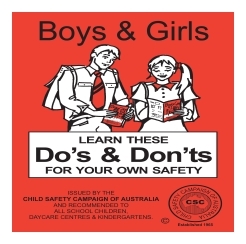KUDOS FROM INDIA!
 Thursday, June 18, 2009 at 2:45PM
Thursday, June 18, 2009 at 2:45PM Subject: Using Do's and Don'ts materials for safety education in India Message:
I am working with Shell in India.
As a community activity from Shell we are conducting voluntary safety programs in schools in India.
As a part of this program, we intend to go personally to schools in India to educate children on the importance of safety at home, school and on the road .
The Do's and Don'ts material available on your website as a part of sample brochures are very educative and apt for safety education.
We would like to use some of the materials which would be relevant for us for educating children in India. We would like to know if it is ok for us to use these materials. We would of course cite the sources of the materials and provide credits and would not claim to own any of these materials.
I would also like to emphasize that the materials will not be used for any commercial purpose. We do not intend to make any money out of it and it is to be a purely community activity. Looking forward to your response.
Thanks & regards,
Janani Kannan
Shell India
Of course we were delighted to help out and I have given Shell India an affirmative to use our Brochure formats Free of Charge in the hope that the children in India may be educated on accident prevention, it is our pleasure for them to be using the Do's and Dont's!
Trevor Field
Campaign Director
Child Safety Campaign of Australia.
Department of Education Article in Parent Update
 Saturday, April 18, 2009 at 12:31AM
Saturday, April 18, 2009 at 12:31AM
Parent Update
Parent Update > Safety Do's and Don'ts brochure now available 
2009 Edition
January 28, 2009
Safety Do's and Don'ts brochure now available

Every day, 5000 Australian children are involved in accidents and 170 are admitted to hospital. The Child Safety Campaign aims to do its part in reducing this statistic, with the recent re-launch of its do’s and don’ts safety brochure in Victoria.
Formed in 1965 in conjunction with the then National Safety Council of Australia, the Child Safety Campaign’s updated brochure contains a list of 12 safety do’s and don’ts for parents to review with their children.
Campaign director Trevor Field said the brochures have already been distributed to pre-schools, kindergartens and primary schools throughout parts of country Victoria, and will continue to be distributed to all Victorian country and metropolitan schools by the end of term two this year – so keep an eye out for it in your child’s school bag.
Some examples of the do’s and don’ts for kids:
- DO cross the road at traffic lights or school crossings whenever you can. Red means stop, amber means be careful and green means go if safe.
- DO go straight home from school every day. Always play where mum and dad say – they know best.
- DON’T chase your ball or a playmate on to the road. You could be run over by a car or truck and be killed or injured.
- DON’T play near rivers, creeks or storm drains. You might fall in and drown.
For a copy of the brochure, contact your local school.
Fire safety
 Thursday, March 19, 2009 at 7:32PM
Thursday, March 19, 2009 at 7:32PM 
"Staying alive" is a great Canadian site about fire safety. It is filled with tips and information, and also has great pages for kids. Go check it out!
 canadian,
canadian,  fire safety,
fire safety,  website in
website in  For kids,
For kids,  For teachers,
For teachers,  Other resources
Other resources Have fun, be safe!
 Monday, March 16, 2009 at 2:35PM
Monday, March 16, 2009 at 2:35PM  The United Nations Children's Fund (UNICEF), together with the World Health Organisation (WHO), has published an excellent folder about injury prevention.
The United Nations Children's Fund (UNICEF), together with the World Health Organisation (WHO), has published an excellent folder about injury prevention.
The folder talks about daily-life situations and offers a bunch of safety tips. It can be used as work material at home or in the classroom. It is aimed at children of 7 to 10 years old.
This publication can be downloaded or ordered for free from the UNICEF website.
 UNICEF,
UNICEF,  WHO,
WHO,  classroom,
classroom,  injury,
injury,  publication in
publication in  For teachers
For teachers 


